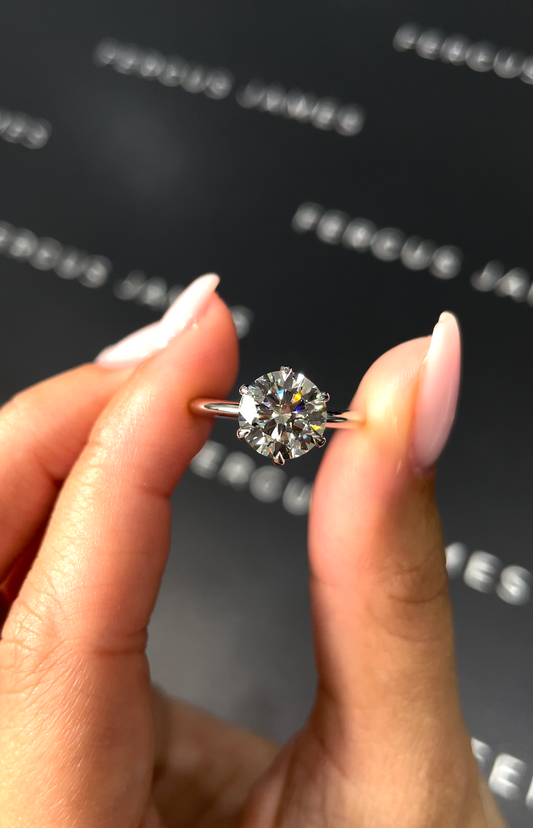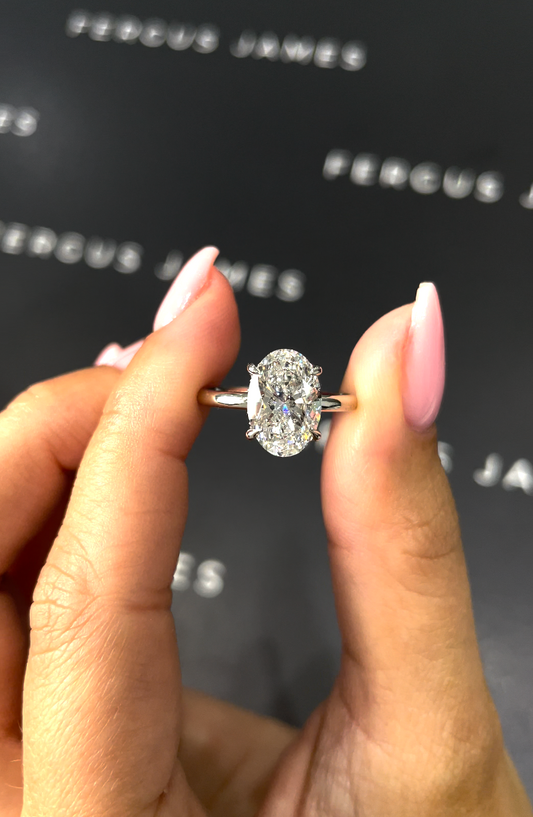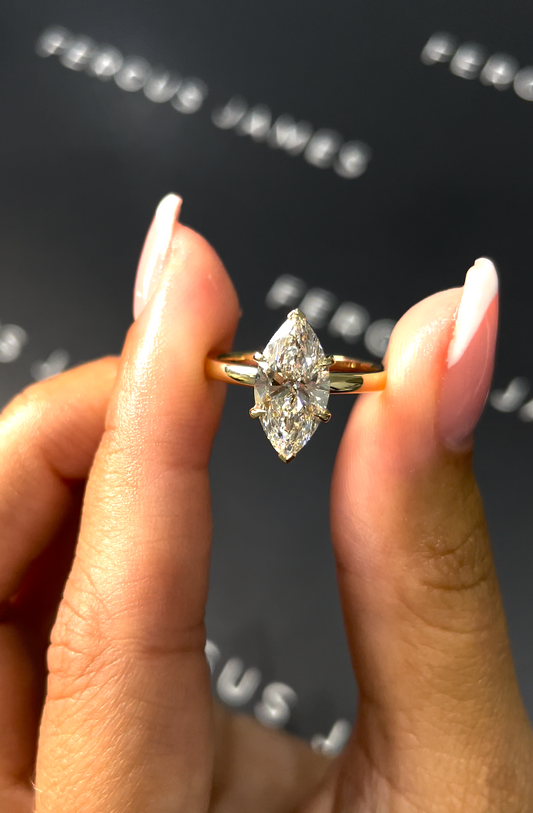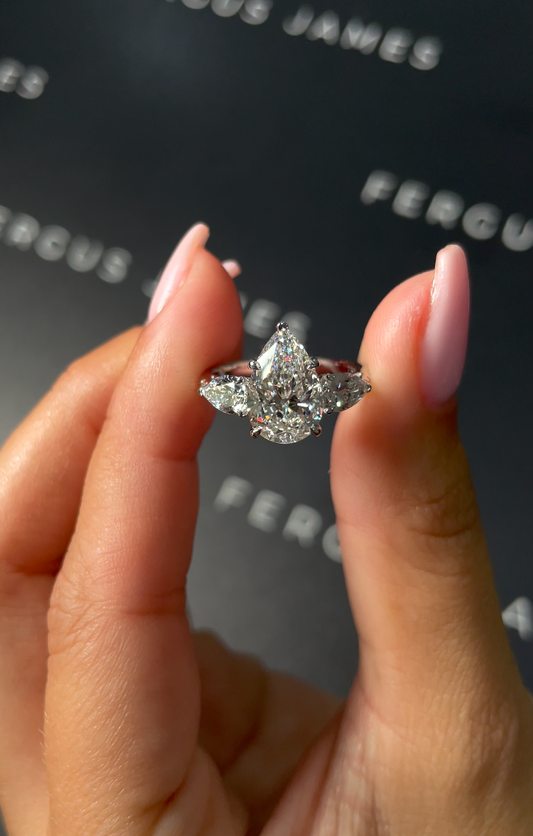How to Clean Your Engagement Ring: Fergus' Top Tips
An engagement ring isn’t just a piece of jewellery—it’s a symbol of commitment, love, and the beginning of your future together. Over time, even the most brilliant diamond can lose its sparkle due to daily wear, oils, and residue. The good news is that with the right care and maintenance, you can keep your ring looking just as stunning as the day you received it.
At Fergus James, we know how important your engagement ring is to you. Whether your diamond is natural or lab-grown, these top cleaning tips will help preserve its beauty and brilliance for years to come.


Why Regular Cleaning Matters
Even if you’re careful, daily life exposes your engagement ring to substances that can dull its shine—hand creams, soap, dust, cooking oils, and environmental pollutants. While your diamond may still be intact, grime can build up in the setting, making the stone appear cloudy or dull.
Routine cleaning not only restores your ring’s sparkle, it also helps identify any potential damage early, such as loose prongs or chipped stones.
1. Use a Gentle Cleaning Solution at Home
The safest and easiest way to clean your engagement ring at home involves warm water and mild dish soap.
Step-by-step:
- Fill a small bowl with warm (not hot) water
- Add a few drops of gentle, non-moisturising dish soap
- Soak your ring for 10 minutes
- Gently scrub with a soft-bristled toothbrush (focusing around the setting)
- Rinse under warm water and pat dry with a lint-free cloth
Tip: Make sure to plug the sink drain if you’re cleaning over one—just in case.
This method is suitable for most natural and lab-grown diamonds, as well as common setting metals like platinum and gold.
2. Avoid Harsh Chemicals
Household cleaners like bleach, acetone, or chlorine can erode the metals in your setting and damage softer gemstones. Even strong jewellery cleaners can sometimes be too harsh if used incorrectly.
Avoid:
- Toothpaste or baking soda (they are abrasive)
- Ammonia-based glass cleaners
- Ultrasonic cleaners unless specifically approved
If in doubt, stick with warm water and dish soap or consult a professional.
3. Schedule Professional Cleaning
While at-home care is important, nothing compares to a professional clean. At Fergus James, we recommend bringing your engagement ring in for professional cleaning and inspection every 6 to 12 months.
Why professional cleaning matters:
- Removes buildup in hard-to-reach areas
- Polishes the metal to restore its original shine
- Allows a jeweller to check for loose prongs or damage
Professional ultrasonic and steam cleaners are more powerful and effective—but should be used by experts to avoid damage to delicate settings.
4. Clean Based on Lifestyle and Wear
If you wear your engagement ring daily, aim to clean it once a week at home and inspect it regularly. Those who work with their hands or wear lotions and creams often may need to clean their ring more frequently.
If your ring has intricate detailing or is a pavé setting, dirt can build up faster. Similarly, lab-grown diamonds behave just like natural ones, so they require the same level of care.
5. Travel and Storage Tips
Travelling or heading to the gym? It’s best to take your ring off during certain activities to prevent grime and impact damage.
Do:
- Store in a soft, lined jewellery box or pouch
- Keep your ring away from direct sunlight and chemicals when not worn
- Use a dedicated case if travelling
Don’t:
- Toss your ring into a purse or bag unprotected
- Wear your ring while swimming or using tanning products
6. Consider a Jewellery Cleaning Pen
A jewellery cleaning pen is a convenient on-the-go option for light maintenance. These pens dispense a gentle cleaning solution through a soft brush tip and are perfect for refreshing your ring before a special event or photo.
Just make sure the pen you choose is suitable for your ring’s metal and stone type. Most are safe for diamonds but may not be ideal for softer gems like emeralds or opals.
7. Know Your Ring's Material
Every engagement ring is unique. While diamonds are one of the hardest natural materials on earth, the metal and setting style matter when it comes to cleaning.
Platinum and gold: Highly durable and safe to clean with dish soap and water
White gold: Often rhodium-plated, so over-cleaning or harsh products can wear down the coating over time
Rose gold: More delicate, may benefit from professional cleaning over DIY methods
Lab-grown diamonds: Require the same cleaning care as natural diamonds—they’re chemically and visually identical
If you’re ever unsure, speak with a Fergus James advisor before attempting any cleaning method.
8. Common Mistakes to Avoid
Even with good intentions, certain habits can damage or diminish the appearance of your engagement ring.
Avoid these cleaning mistakes:
- Using paper towels or tissues to dry (can scratch metal)
- Scrubbing too hard with a stiff brush
- Skipping professional inspections
- Cleaning too often with harsh products
Gentle, regular care is always best.


Final Thoughts
Your engagement ring is more than jewellery—it’s a promise, a memory, and a part of your everyday life. With proper cleaning and care, it will retain its brilliance and beauty for generations.
At Fergus James, we are committed to helping you care for your diamond investment. Whether you chose a lab-grown or natural diamond, our team is here to support you with expert advice, maintenance services, and lifetime care options.
Need a professional ring clean or inspection?
Book your appointment or contact our team to ensure your diamond always shines its brightest.
































